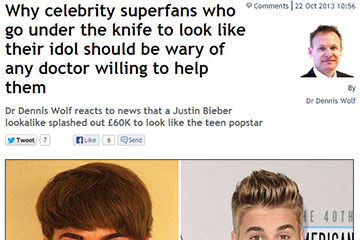
Why celebrity superfans who go under the knife to look like their idol should be wary of any doctor willing to help them
PLASTIC AND COSMETIC SURGERY
Daily Mirror
The decision to undergo cosmetic surgery in order to look like a celebrity idol is a particularly concerning one for many reasons.
It is not unusual for a patient to come to me clutching an image of a celebrity in their hands.
Occasionally it is only a picture of a particular body part, like the buttocks for example. When this happens, alarm bells ring.
It is clear that, more often than not, a patient like this will have completely unrealistic expectations of the results that can be achieved through cosmetic surgery . And if that is the case I, like most practitioners, would advise they do not go ahead with treatment.
In this instance, as a doctor, I would also suspect that the patient may have an underlying disorder, such as Body Dysmorphic Disorder. This disorder can present itself in various forms.
Often a patient with Body Dysmorphic Disorder will be extremely critical of themselves, of their physique or self-image and may perceive a defect where there is none. This may be associated with a lack of self-worth, poor self esteem or a lack of confidence.
The reason the expectations of a patient like this are so unrealistic can also be because they don’t understand the reality of what a cosmetic procedure involves and how it will actually change the way they look.
When it comes to our appearance, every person is different. From skin type and facial aesthetics through to bone structure and the storage of fat – we are all completely different.
As a result, the way we respond to cosmetic procedures is also very different and so choosing to have Botox or a rhinoplasty (nose job) or liposuction, for example, in a bid to look like someone else is not wise or at all realistic.
Cosmetic treatments should take into account, and be sympathetic towards, an individual’s appearance and body shape; they are not a means of transforming one person into somebody else.
Take our faces, for example. When I come to assess whether a person is suitable for a procedure like Botox, I take into account factors such as the person’s age, skin type, whether they are showing signs of ageing, their bone structure and the general makeup of their face.
Facial aesthetics is a complex science and even a procedure as relatively straight forward as Botox will change patients’ appearances in slightly different ways.
The same is true of a procedure like a hair transplant. Every person’s hair line is different and trying to replicate the way another person’s hair sits or grows is virtually impossible.
What is perhaps even more worrying than a patient with unrealistic expectations undergoing cosmetic surgery, is a very young patient doing so. The reality is that no reputable professional should be delivering a cosmetic procedure to a very young patient.
When someone is still a teenager, it is not yet clear how their appearance will change and develop with age. Performing a hair transplant, for example, on a teenager is not ethical because we have no way of knowing how that person’s hair line with mature as they get older, while a lot of other cosmetic procedures are sought for anti-ageing purposes, so again performing these on a young patient is just not appropriate.
Ultimately, before a practitioner agrees to perform any kind of cosmetic procedure they should consider the motivations and mental wellbeing of the patient.
Are they doing this for the right reasons? Are their expectations realistic? Do they actually need the procedure? Every patient should go through a proper consultation and counselling process before any procedure is agreed to.
In cases where alarm bells ring, the patient should be sent for a psychological assessment to determine whether they have insight into why they want to proceed with the procedures and whether their expectations are realistic. Caution is key here.
On the flip side, we should also consider who is delivering these procedures. Patients should be wary of any doctor or surgeon who promises to make them look like a celebrity. No professional can ever realistically promise a patient that the outcome of a procedure will leave them looking like their idol.
Dr Dennis Wolf is Joint Medical Director at The Private Clinic of Harley Street.




